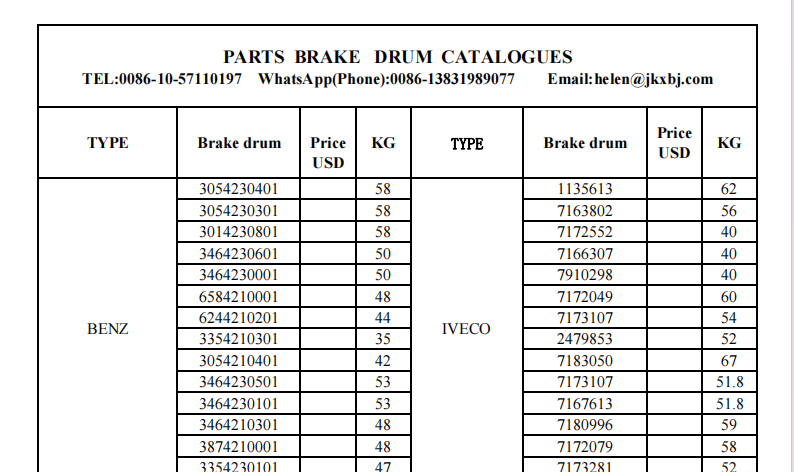Oct . 06, 2024 15:38 Back to list
when to replace brake drums and shoes
When to Replace Brake Drums and Shoes A Comprehensive Guide
Brakes are one of the most critical components of your vehicle, ensuring safety and efficiency while driving. Over time, brake drums and shoes wear down due to constant friction, and knowing when to replace them is vital to maintain optimal braking performance. In this article, we will discuss the signs indicating the need for replacement, the factors that affect the lifespan of brake drums and shoes, and the benefits of timely replacements.
Understanding Brake Components
Before diving into replacement guidelines, it’s essential to understand what brake drums and shoes are. Brake drums are part of the drum brake system, which consists of a hollow drum that rotates with the wheel. Inside the drum, brake shoes press against the inner surface of the drum to slow down or stop the vehicle. This system is often used in rear brakes of heavier vehicles and some smaller models.
Signs Your Brake Drums and Shoes Need Replacement
1. Squeaking or Grinding Noises One of the most common indicators of worn brake shoes is a high-pitched squeak. This noise is typically produced by a wear indicator built into the brake shoe material. If you hear grinding, it may indicate that the shoes have worn down completely, and the metal backing is in contact with the drum, leading to further damage.
2. Decreased Braking Performance If you notice that your vehicle takes longer to stop or feels unresponsive when you press the brake pedal, it may be time to inspect your brake components. Reduced effectiveness could signal that the shoes have worn thin or that the drum is damaged.
3. Vibration or Pulsating When you apply the brakes, if you experience any shaking or pulsating through the pedal, it may indicate warped drums. This can result from excessive wear, heat, or poor installation, requiring immediate attention.
4. Pulling to One Side If the vehicle tends to pull to one side while braking, it may point to uneven wear between the brake shoes. This can compromise braking efficiency and needs to be addressed promptly.
5. Visual Inspection Regularly checking your brake components during routine vehicle maintenance can help spot wear early. Inspecting the thickness of the brake shoes can provide insight—if they are less than a quarter inch thick, it might be time for replacement.
Factors Affecting Lifespan
Several factors influence the lifespan of brake drums and shoes
when to replace brake drums and shoes

- Driving Habits Aggressive driving, frequent hard braking, and stop-and-go traffic can lead to faster wear of brake components
.- Material Quality The type of brake shoes and drums installed can impact their durability. Higher-quality materials often last longer than cheaper alternatives.
- Environmental Conditions Frequent exposure to moisture, road salt, and debris can accelerate wear.
- Vehicle Type Heavier vehicles typically exert more force on brake components, leading to quicker wear.
Benefits of Timely Replacement
1. Enhanced Safety Regularly replacing brake drums and shoes ensures your vehicle can stop effectively, reducing the risk of accidents.
2. Cost-Effectiveness Waiting too long to replace worn components can lead to more extensive damage, requiring more costly repairs down the road.
3. Better Vehicle Performance New brakes ensure that your vehicle stops smoothly and efficiently, improving overall driving experience.
4. Extended Life of Other Components Worn brakes can put extra strain on other parts of your vehicle, like the wheel bearings and suspension system.
Conclusion
Understanding when to replace brake drums and shoes is crucial for vehicle safety and performance. By paying attention to the signs indicating wear, considering the factors that influence their lifespan, and acting on timely replacements, you can ensure a safer driving experience. Regular inspections and maintenance not only save money in the long run but also contribute significantly to your vehicle's reliability on the road. Always consult with a professional mechanic if you're unsure about the condition of your brakes to ensure your vehicle remains safe and roadworthy.
-
Scania Brake Drums: OEM Quality for Optimal Safety & Durability
NewsAug.16,2025
-
R.V.I: Advanced Remote Visual Inspection for Precision
NewsAug.15,2025
-
Discover HYUNDA: Innovative Vehicles, Equipment & Solutions
NewsAug.14,2025
-
R.V.I: Unlock Advanced Insights & Real-time Performance
NewsAug.13,2025
-
Kamaz Brake Drum: Durable & Reliable for Heavy Duty Trucks
NewsAug.12,2025
-
Heavy Duty Iveco Brake Drum - Premium Quality & Safety
NewsAug.11,2025
